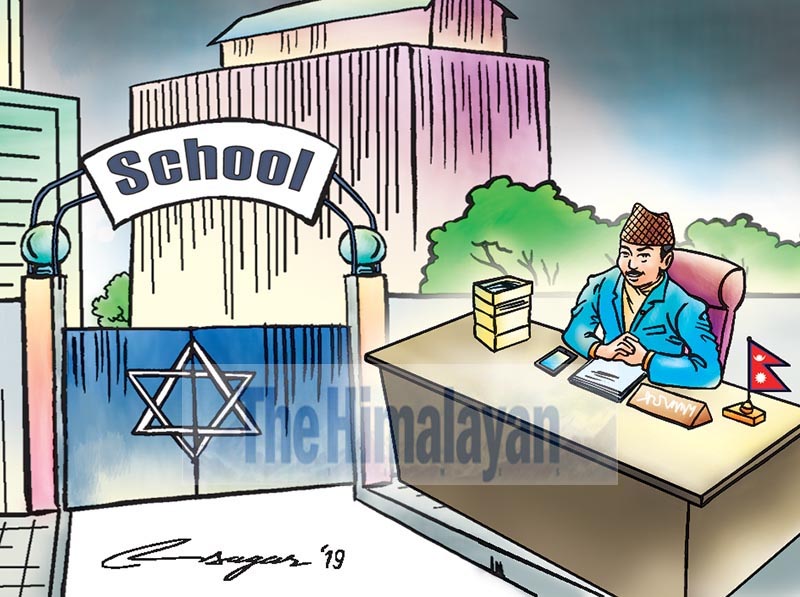Country’s education sector at crossroads
The education sector in Nepal, as in many other developing nations, is at the crossroads. Millions of students from low income families, many of which are from historically vulnerable and disadvantaged communities, have been left behind, deprived of their rights to education.
Amid the feud between the government and private schools around the issues of fees payment during the lockdown, what is really worrisome is the learning status of students enrolled in public schools, especially in the semi-urban and rural areas of the country.
Cognizant that the proposed alternatives devised for them, mostly based on daily programming on radio and TV, have failed, it is time we reflected on cost-effective ways to ensure that these children will no more be deprived of their learning rights.
Given that no other options were available for them at the outset of the lockdown, focusing on radio and TV was the right thing to do despite the extremely short length of the daily classes.
Policy makers and stakeholders in the education sector should wonder now what can be done to address such shortcomings because running educational classes on radio or TV or on a low Internet bandwidth could be a way to reinforce the traditional class-based learning process once the educational system in the country returns to normalcy.
There is no doubt that focusing on technologies and creative learning contents could also open doors to more social innovation in which a new generation of social entrepreneurs are attracted by the opportunity to design and deliver, engaging educational contents that can enrich rather than replace traditional forms of learning.
For example, these opportunities defined as ‘edutainment’ are already playing an important role in the teaching process in Eastern Africa where programmes created by the social enterprise UBONGO are already reaching 11 million households.
The platform uses fun, engaging material specifically designed to generate a new enthusiasm and interest in learning among disadvantaged children, accessible to them through radio, TV, mobile or web.
For example, it is encouraging that Creative Edutainment World defines itself as a ‘Smart Creative Agency upgrading Education’ outfit focussed at leveraging the potential of edutainment opportunities in Nepal. They are coming up with interesting products that hopefully can also be available, with the right partnerships, to low income families. (Disclaimer: I have no relationships or have any type of personal interest in Creative Edutainment World).
It is promising to see that Nepali entrepreneurs are forging ahead, seeing opportunities to create new ventures that can help reshape the educational system.
Coming up with new forms of learning should be seen as instrumental to the overall aim of turning around the way public schools works, rebooting it from a concept of equity.
Such a revamping process cannot simply be outsourced and handed over to the promises of technology and ingenuity of our entrepreneurs alone because ultimately we are having an opportunity to rethink the entire national educational system.
This is not the right time to stop imagining a different, a better public education in Nepal; it is not time to lose hope.
There is no doubt that private schools should have a stronger role and better defined responsibility in providing education beyond the concept of turning a profit with every academic year.
While private schools can increase the number of scholarships or forge partnerships with local schools, policy makers need to focus on making the teaching profession one of the most admired in the country.
The infrastructure of public schools, managed by local communities but now under the purview of local governments, should be nothing less than top class.
Community members play a huge role, too, often overlooked. It is now of utmost priority to recognise their role and contributions.
All parents, especially those from marginalised and low income households, should have a voice to determine the way public education in a federal Nepal can be revamped and have a say on the quality of education being provided.
Let’s not take for granted anyone simply because of lack of formal education or because of their illiteracy.
Udaya Manandhar, an educational expert and development practitioner with decades of experience, shared that “no matter the level of education or ability to read and write, parents can support their children in reading at home, talking to them during daily tasks and influencing their vocabulary and reading and writing skills”.
Local public schools, especially in the rural areas, often become hotspots of corruption, but it is undeniable that there are also many instances of local citizens, mostly parents, getting engaged and taking pride in creating a conducive learning environment for their children, giving results to great students’ performances.
Manandhar believes that local schools could become the engine of civic engagement. I cannot agree more with him.
Local governments surely have a daunting task ahead considering the fact that the role of Resource Persons within the now defunct district education offices is now abolished.
While often underperforming, the Resource Persons held, potentially, a strategic position within the system and could have been easily repositioned and remodelled under the new federal system.
Reimagining a stronger, more equitable public education should be an inclusive process where the government in its all forms, shapes and levels, supports and enables rather than stifling and constraining local ingenuity.
Authorities should partner with different stakeholders, donors, local NGOs with expertise in education and last but not the least, with parents and other engaged citizens determined to bring Nepal to the next level of development because that’s what investing in public education can do.
Galimberti is a columnist with THT-Perspectives and the Co-Founder of ENGAGE, an NGO partnering with youths living with disabilities. He can be reached at simone_engage@yahoo.com






